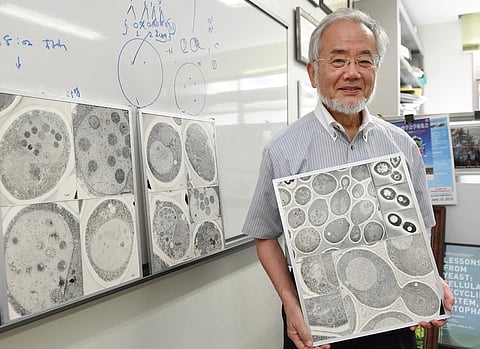Meet Yoshinori Ohsumi, the man who found evidence for autophagy
During periods of fasting, the human body begins to consume its own damaged cells

Yoshinori Ohsumi, a Japanese cell biologist, earned the 2016 Nobel Prize in Physiology or Medicine after discovering one of the body’s most powerful self-healing mechanisms: during periods of fasting, the human body begins to consume its own damaged cells, triggering a deep cellular reset known as autophagy.
This natural process acts like an internal cleanup system.
It breaks down old proteins, malfunctioning components, and toxic buildup that contribute to aging and disease.
Ohsumi’s pioneering yeast experiments revealed autophagy’s core genes and mechanisms, showing how cells recycle under stress like starvation.
By identifying the machinery for autophagy in yeast, Dr Ohsumi made available the research tools required to investigate autophagy in humans.
His discovery now helps scientists know that autophagy controls important physiological functions where cellular components need to be degraded and recycled.
Autophagy can rapidly provide fuel for energy and building blocks for renewal of cellular components – and is therefore essential for the cellular response to starvation and other types of stress.
Cells also use autophagy to eliminate damaged proteins and organelles, a quality control mechanism that is critical for counteracting the negative consequences of aging.
Recycling, renewal
Researchers found that autophagy boosts cellular renewal, supports immune function, protects against neuro-degeneration, and improves overall resilience.
When the body isn’t busy digesting food, it shifts focus to maintenance and repair, recycling damaged parts into fresh, healthy components.
This helps reduce inflammation, sharpen brain function, and improve the body’s ability to handle stress.
Some studies even show that activating autophagy may lower the risk of chronic conditions linked to aging.
Ohsumi’s Nobel-winning research transformed how scientists view fasting, turning it from a simple diet trend into a legitimate biological reset.
Doctors now say intermittent fasting — when done safely — can help support long-term cellular health, boost energy, and improve metabolic balance.
A 2023 study published in Science Direct bears this out.
The study ("The effect of prolonged intermittent fasting on autophagy, inflammasome and senescence genes expressions: An exploratory study in healthy young males"), by Zulrahman Erlangga, et al. examined healthy young males during Ramadan fasting (17-19 hours daily) and found that prolonged IF significantly affects autophagy, inflammasome, and senescence gene expressions over time, with distinct patterns emerging across fasting phases.
The study used a "longitudinal" design during Ramadan 2023, tracking healthy young males practicing prolonged intermittent fasting (17-19 hours daily) over 29 days.
Blood samples were collected at multiple time points: pre-dawn (suhoor), noon, sunset (iftar), and post-dinner across fasting phases. Researchers measured gene expression changes in autophagy (ATG5, BECN1), inflammasome (NLRP3, IL1B), and senescence (p16, p21) pathways using quantitative RT-PCR analysis.
Key findings of this study
Autophagy activation increases with fasting duration: Autophagy-related genes (like ATG5, BECN1) showed upregulation peaking around mid-fasting, confirming IF triggers cellular cleanup mechanisms more effectively in later stages, supporting its role in recycling damaged components.
Mixed effects on inflammasome and senescence: While inflammasome genes (NLRP3, IL1B) initially rose, senescence markers (p16, p21) displayed variable responses, suggesting IF modulates inflammation and aging processes but requires careful timing for optimal benefits.
Not a cure all
While it’s not a cure-all, the discovery showed that the body has extraordinary built-in abilities to heal itself when given the right conditions, according to Science.
For millions around the world, Ohsumi’s work opened a new window into how deeply our lifestyle affects our cells — and how something as simple as timing our meals can unlock one of the body’s most powerful repair systems.
Sign up for the Daily Briefing
Get the latest news and updates straight to your inbox


